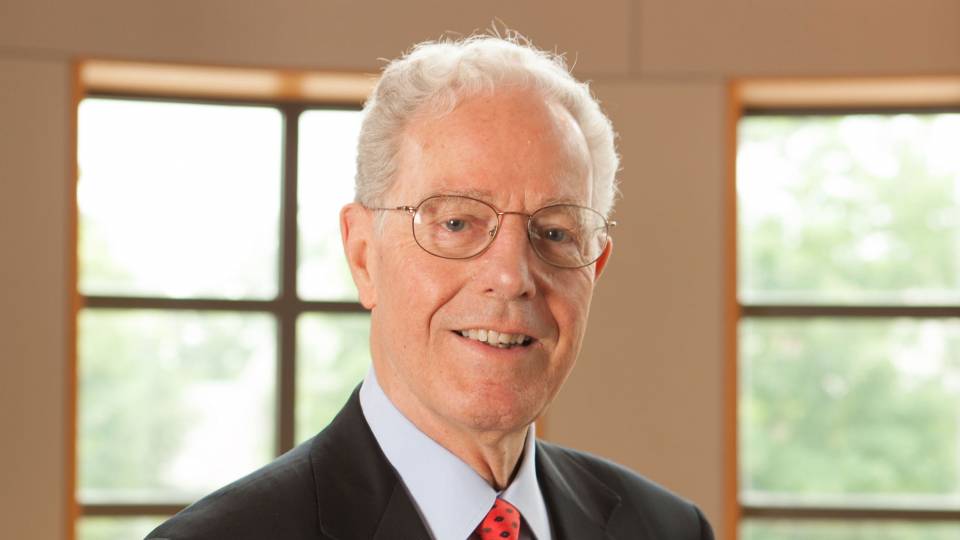William Frist's transition from surgeon to Senate majority leader -- a path forged from his dual concentration in science and public policy at Princeton -- brings a unique perspective to his new role, influencing his push for swift Medicare reform and increased AIDS research, Frist said in his Alumni Day address Saturday.
Since being elected to the Senate from Tennessee in 1994 -- becoming the first practicing physician since 1928 to serve in Congress -- Frist has seen many similarities between being a legislator and practicing medicine during his years as a renowned heart surgeon.
"Both are healing. Both involve patience," he said, circling the podium in front of a capacity audience of alumni and students at Richardson Auditorium in Alexander Hall. "Both involve taking calculated risks in terms of some boldness and some courage. Both involve listening."
Frist, who specialized in health care policy and earned his A.B. from Princeton in 1974, is this year's recipient of the Woodrow Wilson Award. The award is bestowed annually upon an undergraduate alumnus or alumna whose career embodies the call to duty in Wilson's famous speech, "Princeton in the Nation's Service."
Since taking over from Trent Lott as Senate majority leader in January, Frist often is asked about the greatest challenge of his new role.
"My answer is to compel the United States Congress to stretch our horizons ... to address what is to me a very obvious growing imbalance between the policies on the one hand and the inevitable, immutable demographic shift caused by the aging of America's population," he said.
With America's baby boom population nearing retirement age, Frist said a "tidal wave" of demand will be put upon the Medicare system. Yet the government, he noted, has not reformed the nearly 40-year-old program to keep up with advances in medical technology and health care costs, leaving many elderly Americans without comprehensive coverage for prescription drugs, preventive care or catastrophic illnesses.
This problem will only get worse as the number of senior citizens doubles over the next three decades, rising from 12 percent of the overall population to 22 percent, Frist warned.
"That wave will begin starting about seven years from now. It is imminent, it is fast-approaching, it is much more powerful than any of us had previously imagined. Our policies don't reflect the realities of that baby boom," he said.
Because legislators are beholden to their election cycles, they are not thinking enough about the long-term fate of Medicare, Frist said. But, he emphasized, as long as the Federal Employees' Health Benefit Plan continues to provide its members -- including himself and other members of Congress -- with broad choices, good benefits and relatively affordable premiums, Medicare must be reformed to provide those same options to all elderly Americans.
Frist also stressed the need for increased funding for AIDS research, echoing comments made by fellow Alumni Day speaker and James Madison Medalist Peter Bell that characterized the continued global spread of the HIV virus as a "devastating humanitarian crisis."
Frist, who travels to Africa every year as a medical mission doctor, recounted the story of meeting an HIV-infected mother in Botswana who was forced to send her children to live with her mother because she was physically unable to care for them. He hoped to help the audience put a face on the overwhelming statistics about AIDS, which has killed 23 million people since 1981 and threatens to kill another 60 million by 2020.
Noting that President Bush proposed $15 billion in spending -- up from $1.2 billion this year -- on the fight against AIDS, Frist stressed that the United States must influence leaders of other nations to take similar action.
"The President of the United States, speaking for the American people, has demonstrated global leadership in opening the eyes of the world to the devastation, to this greatest humanitarian crisis of our times and possibly of all time," he said.
As Senate majority leader, Frist is able to highlight these issues that concerned him as a physician and, ultimately, will affect the health of the entire world.
"My position," he said, "gives me the ability to decide what the United States Senate debates on the floor of that body and what becomes legislation. The priorities that you hear about are affected by my past."
The transcript of Frist's remarks is available online. Additionally, the Webcast of the event is now availble in the WebMedia lecture archives.
Contact: Eric Quinones and Evelyn Tu (609) 258-3601

